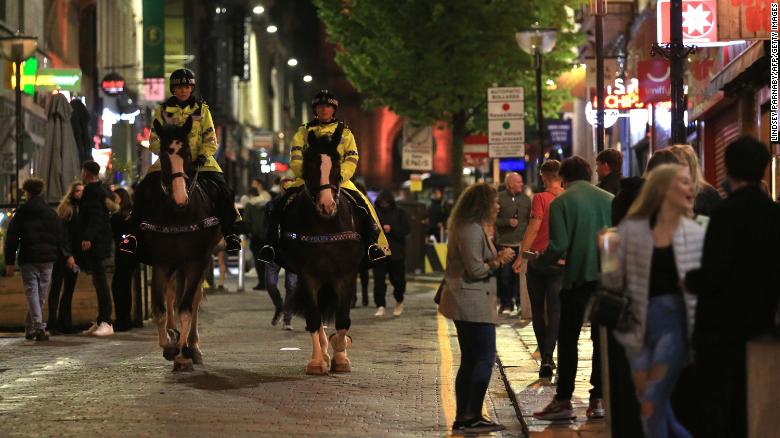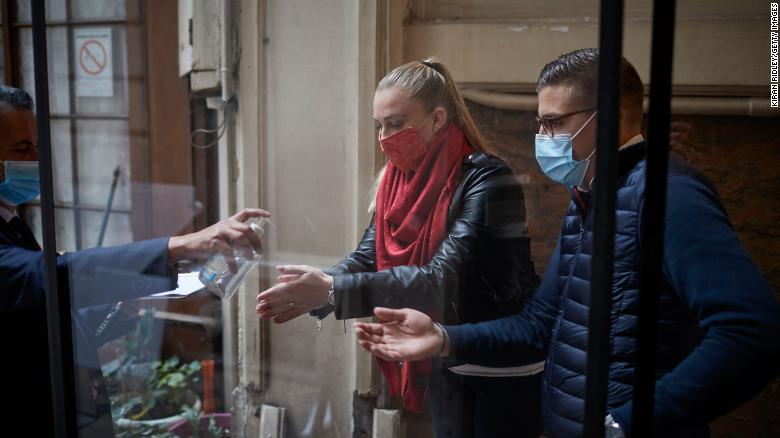European countries including Italy and England are mulling strict new measures to stop the spread of the coronavirus, as cases on the continent continue to soar.
More leaders are preparing to take drastic action, which will likely damage their economies, to contain a second wave of Covid-19 -- following in the footsteps of nations such as France and Spain, which have been forced to tighten restrictions in major cities.
Italy -- one of the worst-hit European countries during the first wave of the pandemic -- is expected to impose new rules this week after Sunday saw the highest increase in coronavirus patients entering intensive care since March 31.
Italy last Thursday brought in a rule mandating the use of masks outdoors and when in close contact with people who are not household members -- with exceptions for young children, people with disabilities or pathologies that preclude mask-wearing, and people playing sports.
Anyone caught breaking the rule faces fines of between 400 and 1,000 euros ($470-1180).
The country on Sunday reported a total of 420 people in ICU -- up 30 on the previous day -- the highest increase since late March. A total of 5,456 new cases and 26 new deaths were recorded Sunday, bringing the nation's Covid-19 death toll to 36,166.
England prepares for tiered system

UK Prime Minister Boris Johnson is set to announce a new system of alert levels in England, as authorities try to curb rising numbers of infections in the country.
Each area of the country will be placed under "medium," "high" or "very high" alert levels, according to a statement from Downing Street. It added that the government was working with local leaders to decide how areas would be classified, and what they will mean.
Liverpool in northwest England is expected to be in the highest tier, which will see restrictions tightened, and gyms, pubs and casinos closed. The middle tier is expected to involve restrictions on households mixing indoors.
The PM was due to chair a meeting of the government's COBRA emergency committee on Monday morning to finalize the details before outlining them in Parliament later. MPs will debate and vote on the measures this week.
"We must do everything we can to protect the NHS (National Health Service) and make sure it can continue to deliver the essential services that so many people rely on," a Downing Street spokesperson said. "This is a critical juncture and it is absolutely vital that everyone follows the clear guidance."
The UK government reported 12,872 new cases and 65 deaths Sunday, meaning the country has recorded a total of 603,716 cases and 42,825 deaths. It reported a record 22,961 daily cases on October 4 following a backlog.
Germany's largest cities have all become hotspots over the past few days, with Berlin seeing the most cases and high numbers also recorded in Cologne, Dusseldorf, Essen and Stuttgart.
Germany reported 2,467 new coronavirus cases Monday, according to data from the Robert Koch Institute (RKI), Germany's public health institute. It came after a daily rise of more than 4,000 over the previous few days -- the highest figures since April.
Stuttgart has asked the military for help in combating the virus. The military is already assisting some areas with contact tracing and running test centers but it is not as common for a large city to request help.
Germany has now recorded 325,331 coronavirus cases and 9,621 deaths, according to the RKI.

The French cities of Toulouse and Montpelier will be added to the "maximum alert" category from Tuesday, France's regional health agencies announced Sunday.
Paris, Marseille, Lille, Lyon, Grenoble, Saint-Etienne and the overseas department of Guadeloupe are already in the "maximum alert category," which means stricter measures including the closure of bars and gyms.
A "maximum alert" level is established when the virus incidence rate rises above 250 cases per 100,000 people, the incidence rate for people aged 65 and above is more than 100, and more than 30% of ICU beds are occupied by coronavirus patients.
French Health Minister Olivier Veran on Sunday responded to criticism of the measures on Twitter.
"Our health workers gave a lot during the 1st wave and are tired," he posted. "What we want is to slow down the virus, avoid severe forms, limit having people in ICUs and limit deaths."
France's national health authority said Sunday that 16,101 new daily cases had been reported. A record of 26,896 new daily cases was announced Saturday.
The positivity rate -- the percentage of tests that are positive -- has risen to 11.5%, up from 7.6% on October 1 and 4.3% on September 1. There have been 32,730 Covid-related deaths in France, according to the health authority.
Aurelien Rousseau, head of the Paris region health authority, said Monday that the positivity rate was 17% in the Paris region. He told CNN's affiliate BFM "this is a number we have never reached."
Latest Stories
-
Afro-Arab Microfinance wins award at 2025 Global Banking & Finance Review Awards
38 minutes -
Government reaffirms commitment to Press Freedom amid AI challenges – Kwakye Ofosu
1 hour -
GPL 2024/25: Kamaradini scores again as Medeama beat Vision FC
3 hours -
GH₵5.8m dialysis centre unveiled at Tetteh Quarshie Memorial Hospital to fight kidney disease mortality
8 hours -
Kuipers Breeders Hatchery celebrates two-year anniversary of first chicks hatched in Ghana
9 hours -
Edmond Kombat appointed acting MD of TOR
9 hours -
U-20 AFCON: Ghana held to 1-1 draw by DR Congo
9 hours -
GNECC commends Free Sanitary Pads initiative, urges strong, sustained commitment
9 hours -
I started singing at age 12 – ACP Kofi Sarpong
9 hours -
My fashion sense inspired my boutique – ACP Kofi Sarpong
10 hours -
Minority raises concerns over Ghana Medical Care Trust Fund, cites inadequate consultation
10 hours -
First Deputy Speaker commemorates May Day with sod-cutting for twin classroom projects in Akatsi South
10 hours -
Her Ghana leads fight against menstrual stigma in Ghana
11 hours -
Utility tariffs impacting profits and growth of hotels – Ghana Hoteliers
11 hours -
This Saturday on Newsfile: Recall of CJ, halt NPP ‘Thank You’ tour, new Supreme Court list
11 hours

